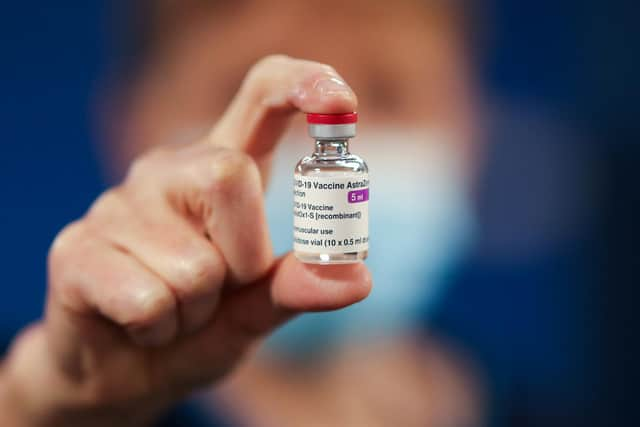UK vaccine supply: is the Covid jab supply delayed, why are there issues - and will under 50s now have to wait?
NHS England has warned that the UK faces a month-long reduction in its Covid vaccine supply from April.
The expected “significant reduction”, confirmed by health leaders on Wednesday 17 March, is partly due to a delay in a delivery of five million AstraZeneca doses from India.
Advertisement
Hide AdAdvertisement
Hide AdThe Oxford-AstraZeneca vaccine accounts for roughly 75 per cent of doses administered in the UK so far, with the Pfizer-BioNTech jab representing the remaining 25 per cent.


More than 25 million people in the UK have received their first dose of a coronavirus vaccine. Around 1.7 million have been inoculated twice.
So, is the UK’s vaccine supply going to be delayed, why are there issues - and what does it mean for under 50s?
Here is everything you need to know.
Is the UK’s vaccine supply delayed?
In a letter to local health organisations, NHS England warned of a reduction in the Covid vaccine supply next month.
Advertisement
Hide AdAdvertisement
Hide AdThe letter said the UK Government’s Vaccine Taskforce had predicted that “reductions in national inbound vaccines supply” would “continue for a four-week period”.
It asked vaccination centres and pharmacy-led jab services to close unfulfilled bookings and “ensure no further appointments are uploaded” to booking systems in April.
Despite the reduction, the Department of Health has insisted it is still on track to offer a first dose of a vaccine to all adults by the end of July.
Prof Adam Finn, a member of the government’s Joint Committee for Vaccinations and Immunisation (JCVI), told BBC Radio 4’s Today programme that the disruption meant the country’s jabs rollout would go from "extremely fast to somewhat less fast", rather than "juddering to a halt".
Advertisement
Hide AdAdvertisement
Hide AdBut both AstraZeneca and Pfizer have insisted that there is no threat to supplies, appearing to contradict the letter from NHS England.
The two major vaccine manufacturers said they remained on course to meet their delivery schedule.
An AstraZeneca spokesperson said: "Our UK domestic supply chain is not experiencing any disruption and there is no impact on our delivery schedule."
Why are there vaccine supply issues?
The predicted reduction in the UK’s vaccine supply is partly down to a delay in the delivery of millions of doses from India.
Advertisement
Hide AdAdvertisement
Hide AdA shipment of five million AstraZeneca doses, produced by the Serum Institute of India, has been held up by four weeks, according to the BBC.
A spokesperson for the Serum Institute of India told the broadcaster: "Five million doses had been delivered a few weeks ago to the UK and we will try to supply more later, based on the current situation and the requirement for the government immunisation programme in India."
Earlier in March, the Serum Institute of India, which is the world’s largest manufacturer of vaccines, agreed to supply 10 million doses for the UK.
Housing Secretary Robert Jenrick said the government learned of the supply issues “in the last few days”.
Advertisement
Hide AdAdvertisement
Hide AdHe said neither a single factory or county was responsible for the problems.
"We have learned from some of our manufacturers that there are going to be some supply issues in the last few days," he told BBC Radio 4's Today programme.
"A number of global manufacturers are experiencing issues."
Mr Jenrick added that the UK had less supply of the vaccine "than we might have hoped for in the coming weeks but we expect it to increase again through the course of April".
Will vaccine targets still be met?
As a result of the supply issues, the vaccine rollout will be slightly slower than expected.
Advertisement
Hide AdAdvertisement
Hide AdProf Martin Marshall, chair of the Royal College of GPs, said the shortage would impact "the group we were hoping to start on in April which is the people under the age of 50 without any pre-existing conditions".
This group will now have to wait until May, he said.
After it opened up appointments to all over-50s on Wednesday 17 March, NHS England was told not to offer a vaccine to younger age groups throughout April.
Health Secretary Matt Hanock told a Downing Street press conference the same day that he wanted to make sure “every last vulnerable person” received their jab before focus was turned to the under-50s group.
Mr Hancock said vaccine supply was "always lumpy”, but insisted the 15 April target for vaccinating over-50s would still be met.
Advertisement
Hide AdAdvertisement
Hide Ad"We are committed to all adults being able to get the jab by the end of July and we are on track to deliver on that commitment,” he added.
A Department of Health and Social Care spokesperson said: “Health services across the UK are working tirelessly to vaccinate those most at risk and more than 25 million people have already received their first jab.
“The vaccination programme will continue in the coming weeks and more people will continue to receive first and second doses.
“As has been the case since the programme began, the number of vaccinations carried out over time will vary due to supply – but we remain on track to offer a first vaccine to over 50s by 15 April and all adults by 31 July.”